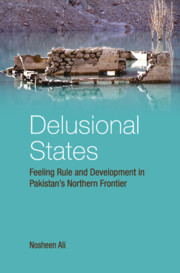Introduction
Published online by Cambridge University Press: 05 June 2019
Summary
In 1993, when I was a student of grade eight in a private school in Lahore, our class was divided up in four groups for a geography project on Pakistan. The group of which I was a part had to make a sculptural map of Pakistan, demonstrating the diverse physical and social qualities of its landscape. And so we had set about carving our country with stuff like styrofoam, cotton, and cardboard. In the final map that we made, the region of Gilgit-Baltistan—then the ‘Northern Areas’—had remained unlabelled and unpeopled, marked only with mountains made of clay.
Even today, nature remains the primary modality through which Gilgit-Baltistan is understood within the Pakistani national imagination. Its magnificent peaks and breathtaking valleys invoke within Pakistanis a simultaneous sense of emotional attachment and proud ownership, permitting them to claim Pakistan as ‘beautiful’. But while Gilgit-Baltistan is externally produced as an idyllic tourist destination, it is internally managed as a suspect security zone. This is because the region is internationally considered as part of the disputed area of Kashmir—a territory that both Pakistan and India claim, and have turned into the most militarized zone in the world over the last seven decades. This is also because Gilgit-Baltistan is the only Shia-dominated political unit in a Sunni-dominated Pakistan.
Ironically, at the heart of the territory of Kashmir—which Pakistan claims on the basis of its ‘Muslim’ identity—lies the region of Gilgit-Baltistan which contradicts this identity by being home to a different kind of Muslim than that endorsed by Pakistani nationalism. Such territorial and religious anxieties transform Gilgit-Baltistan from a place of mythical beauty into a zone of treachery, proudly claimed yet disavowed at the same time. Meanwhile, the inhabitants of the region express a strong yearning for recognition and inclusion within the Pakistani nation-state, and feel a deep love and loyalty towards it—only to find themselves constantly alienated and betrayed. This book charts such dynamics of attachment and alienation, placing at its centre the emotionalities—of love and betrayal, loyalty and suspicion, beauty and terror—that help us grasp how the Kashmir conflict is affectively structured and experienced on the ground.
- Type
- Chapter
- Information
- Delusional StatesFeeling Rule and Development in Pakistan'S Northern Frontier, pp. 1 - 28Publisher: Cambridge University PressPrint publication year: 2019



